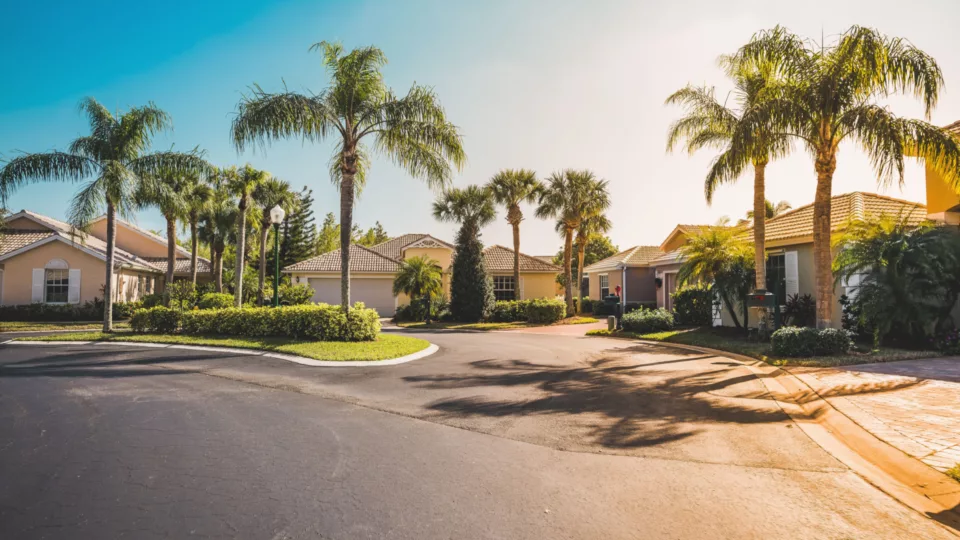In This Article
In the aftermath of our frequent Florida storms, we are usually concerned with the important things in life, like is our home still present and accounted for? Are all family members inside? Did our automobiles float away? And finally, how are the most important creatures doing, aka our pets? In the face of countless storms, Floridians are as durable as barbed wire — provided Fluffy and Ziggy are safe and have all their favorite treats and toys. After a storm, you may be wondering how to file insurance claims for roofing services.
If you are a Florida native or have lived here long enough to qualify for native status, you also know that in the aftermath of a storm the most important thing to pack is patience. Also, the ability to spot scams and predators.
If the past is any predictor, the response from Florida state insurance officials will be steady and competent. Following a storm such as Ian, the Florida Department of Financial Services established pop-up “insurance villages,” one-stop mobile units where homeowners could go to get assistance from insurance providers. The first checks for homeowners were for living expenses, such as food and shelter.
Identifying Storm Damage to Roofing
It’s best if you take on the role of an advocate in theaftermath of a storm. You can start by looking for storm damage to your roof. Wind damage can cause shingles to be dislodged from the roof, or shingles can be bent or broken. Look for granules dislodged from shingles in the gutters, downspouts and where they could be discharged from the downspouts. Dislodged granules are a sure sign that the storm did some damage to your asphalt shingles. Also look for missing fasteners on gutters and vents, as well as cracks or other damages to chimneys.
Insurance inspectors and adjusters will be on the lookout for:
- Proof of the age of your current roof.
- Proper roof installation when it was installed.
- Signs of damage to the interior (attic) and the roof exterior.
- Missing and damaged shingles.
- Missing fasteners on gutters, vents and other roof equipment.
Tips for Filing Insurance Claims for Roofing Services
Insurance claims can be a big first step to get your life back on track after the devastation of a Florida storm. To maximize your compensation, here’s a list of strategies:
- File ASAP. Don’t procrastinate on filing for a claim with your insurance company. While the time limits tend to be generous, up to two years in some instances, you don’t want to miss out because you got caught up in the other challenges of life.
- Document damages. Using images and video from your phone, document the damages the storm caused. While taking video, provide narration to help insurance inspectors understand what happened during the storm and its aftermath.
- Perform emergency repairs. Hire a professional such as Classic Roofing & Construction to mitigate storm destruction by stopping any leaks with effective tarping of your roof, to avoid any further damages that can cause even more expenses.
- Save all receipts, especially if you relocate. Don’t use cash if possible. Best case scenario, you receive an offer for a credit card with no interest for a year or two. Just use the credit card for all costs related to the storm, including additional living expenses for a hotel or an apartment, since insurance policies will cover additional living expenses if your home is uninhabitable. It can also cover the cost of dining out because you don’t have a working kitchen. Regardless, save all your receipts and keep them organized. At this juncture, receipts are like savings bonds.
- Be aware of the two-year time frame. Under Florida law, hurricane claims must be filed within two years of the date of loss. Supplemental claims are limited to three years from the date of loss.
- Use automobile insurance to cover storm damage to your vehicle. If you have comprehensive insurance on your vehicles, this insurance can cover damage to them, including flooding or damage from the surrounding environment, such as trees falling on them or the collapse of a garage. File a claim with your auto insurance company if your vehicles are damaged.
- Work only with licensed professionals. Florida law requires that all roofing work be done by a contractor licensed to perform such work. Hiring an unlicensed contractor can result in a fine to the homeowner of up to $5,000. By choosing Classic Roofing & Construction you can rely on our: $1 million liability insurance, worker’s compensation coverage and Florida general contracting and roofing licenses.
Contracts With Assignments of Benefits Language
Florida law allows a property owner to sign over management of their insurance claim to a third party, including an attorney, adjuster or licensed contractor. As we warned in our blog post on Florida roofing scams, some contractors use these opportunities to file fraudulent roofing damage claims. Additionally, the contractor makes all decisions on the homeowner’s behalf.
When insurance companies refuse to pay these fraudulent claims, contractors and their attorneys sue. This can lead to higher costs for the homeowner, as well as extensive delays to get their roof repaired. Remember in grade school how those in authority would threaten that this would go on your “permanent record”? Well, in the insurance industry, that’s a real thing. Once you sign an AOB agreement, that information is shared with all insurance providers. This can affect your ability to obtain insurance policies in the future.
Flood Damages
Hurricane Ian caused catastrophic damage with losses estimated to be over $50 billion. Much of the damage was from flooding caused by storm surges of between 10 and 15 feet high.
Standard homeowner insurance policies do not cover flooding. Flooding is covered by a separate policy, offered under the Federal Emergency Management Agency’s flood insurance company. Homeowners living in designated federal flood zones are required by lenders to carry flood insurance.
Most homeowners outside these flood zones are uninsured. For the uninsured, flood damages may qualify for a grant from FEMA. President Biden’s designation of Florida as a major disaster area allows residents to ask for up to $37,900 toward home repairs and another $37,900 for loss of vehicles or other personal property. To file a claim with FEMA, go to DisasterAssistance.gov or call 800-621-3362.
FEMA Paid $1.2 Billion in Advance Payments
Meanwhile, 46,000 of those policyholders living in designated federal flood zones have received $1.2 billion in advance payments from FEMA. FEMA now estimates Hurricane Ian could result in NFIP (National Flood Insurance Protection) losses amounting to anywhere from $3.7 billion to $5.2 billion. The losses include flood insurance claims received from five states. The vast majority of claims, however, are from Florida.
“FEMA and the entire federal family have provided billions of dollars in support to help Florida recover and affected residents jumpstart their recovery,” said FEMA Administrator Deanne Criswell in a recent press release. “The $1.2 billion paid to NFIP policyholders represents our continued commitment to this critical mission and underscores the importance of purchasing flood insurance. That’s why we continue to encourage Floridians who may have let their flood insurance coverage lapse to take advantage of our extended grace period and renew their coverage today by contacting their insurance company or agent.”
The NFIP announced in October that it extended the grace period to renew one’s policy from 30 to 90 days for certain Florida policyholders in counties where individual assistance has been authorized.
8,000 Florida Homeowners Still Qualify for Renewal
More than 8,000 Florida policyholders may still renew their policy due to the grace period extension. To maximize awareness of the grace period extension, FEMA staffers are going door-to-door to notify policyholders of this opportunity. Flood insurance inspectors and agents are also alerting policyholders of this opportunity.
FEMA is encouraging all those with expired flood insurance policies in the 26 Florida counties designated for FEMA’s Individual Assistance Program to renew their policies ASAP. Contact your agent or your insurance company to renew your policy and file any needed claims of loss. If you don’t know your agent or insurance company is, call 877-336-2627 for assistance.
Need Help With Repairs? Contact Classic
We hope these tips help answer questions about filing insurance claims for roofing services. If your home or business suffered damages from a storm, we can help. Classic Roofing & Construction provides free estimates and easy financing for a new roof or flood remediation measures.





